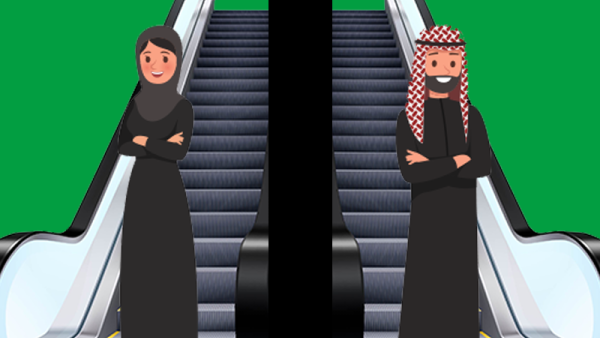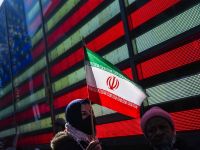- "Create women-only malls" is trending in Saudi Arabia
- Gender segregation promotes women's freedom, some say
- Others call it "backwards"
- The hashtag comes as Saudi undergoes a massive reform program
by Rosie Alfatlawi
Gender segregation is the way to advance women’s rights. At least, that is according to some Saudis on Twitter.
Crown Prince Mohammed bin Salman may have reaped international praise for his fast-paced “reform program,” which has ensured greater freedoms for Saudi women.
Still, many in the ultra-conservative Gulf state have backed a recent hashtag on social media asking for the “creation of women-only malls."
The concept is not entirely new. One mall in Riyadh has for a decade cordoned off a floor just for women, calling it “the Ladies Kingdom.”
In fact, under the kingdom’s conservative interpretation of Islam, which prohibits gender mixing, most public spaces are already divided into areas for single men, and areas for families or groups of women.
However, amid MBS’ fast-paced changes, which have seen women allowed to drive, enter stadiums and publicly perform for the first time, some see the call as “backwards.”
It’s like we’re taking steps backwards #وضع_المولات_للنسا_فقط
— (@rrrmzaa) January 8, 2018
1950: i bet there will be flying cars in 2018
— Seventy7 (@iiseventy7) January 8, 2018
68 Years leter
2018: #وضع_المولات_للنسا_فقط
Nonetheless, its backers - male and female alike - insist that this is the way to liberate women.
“In addition to normal family shops,” said @Alyahyamo7ammad in a post retweeted over a thousand times. “Women have the right to have their own places where they can exercise their full freedom to dress, move, shop and eat.”
“This is women’s freedom,” claimed @Alsaadd14081.
@hanutlpw tweeted: “It’s my life’s dream to go to an all-women’s mall, relax and take off our abayas and go shopping at liberty.”
The loose, long, black abaya covering is compulsory wear in public for Saudi women, along with the hijab.
Others emphasized the potential economic benefits for women to be gained by such a project.
@ragooda__ added her support, saying that “there would be more job opportunities for girls, and female shoppers would feel [more] comfortable.”
A third of Saudi women are unemployed, five times more than their male counterparts, according to the Financial Times.
Increasing female participation in the workforce is one of the aims set out in Bin Salman’s economic reform plan, Vision 2030. The program seeks to boost women’s employment from 22 percent currently to 30 percent.
The retail sector is one area where Saudi women have already made advances, with 200,000 employed in it according to the FT.
Gender segregation is not, in fact, a novel way of increasing work opportunities for Saudi women. The nation’s labor ministry has been implementing a “feminization” program for employees in shops selling women’s accessories.
The Saudi Gazette reported that this was intended to “expand fields of employment for Saudi women in the private-sector establishments.”
While women-only ventures might have the worthy intention of providing work for women, they are also driven largely by prevailing conservative values.
Manager of the women-only floor at Kingdom Mall in the capital, Nada Al-Ateegi, told researcher Amélie Le Renard that it is a “place of freedom and privacy” for Saudi women, but also that it respects the “customs and traditions” of society.
It is these attitudes which Bin Salman’s dramatic changes threaten to rub up against.
Read More:







